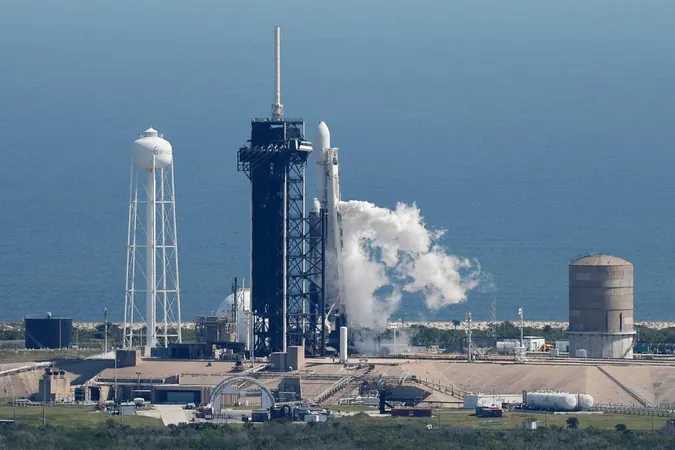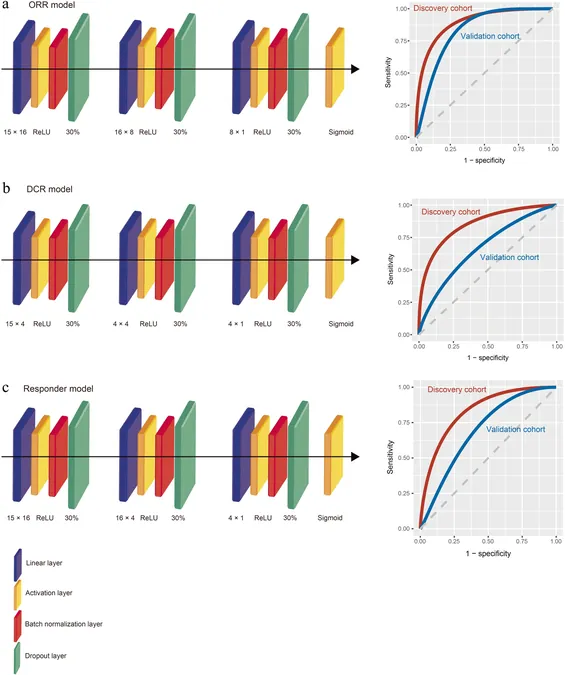
NASA's Ambitious Journey: Searching for Life on Jupiter's Mysterious Moon Europa
2024-10-14
Author: Daniel
NASA's Ambitious Journey: Searching for Life on Jupiter's Mysterious Moon Europa
In an exhilarating leap for science, NASA launched the Europa Clipper spacecraft from Florida on Monday, embarking on a groundbreaking mission to investigate if Jupiter's moon Europa has the right conditions to support life. This ambitious mission will focus on Europa's vast subsurface ocean, which is thought to exist beneath its thick icy shell, making it one of the most intriguing celestial bodies in our solar system.
The Europa Clipper took off from the Kennedy Space Center in Cape Canaveral atop a SpaceX Falcon Heavy rocket, under clear blue skies, after its launch was postponed due to the threats posed by Hurricane Milton. The spacecraft, which is the largest ever built by NASA for a planetary mission, measures approximately 100 feet (30.5 meters) long and 58 feet (17.6 meters) wide when its solar arrays and antennas are fully deployed. Weighing around 13,000 pounds (6,000 kg), this sophisticated probe is set to embark on a 5.5-year journey that covers about 1.8 billion miles (2.9 billion km), aiming to enter Jupiter's orbit by 2030.
Europa, the fourth-largest of Jupiter's 95 moons, may host more than twice the amount of water found in all of Earth's oceans, despite measuring only a quarter of Earth's diameter. With a diameter of roughly 1,940 miles (3,100 km), Europa's icy crust likely spans 10-15 miles (15-25 km) thick, resting atop an astonishing ocean that could be 40-100 miles (60-150 km) deep. This hidden ocean presents an environment that could potentially mirror the conditions believed to have sparked life on Earth.
Jim Free, NASA's Associate Administrator, emphasized the significance of this mission, highlighting Europa as one of the most promising candidates for habitability beyond Earth. However, he clarified that the Europa Clipper will not actively search for living organisms. Instead, it will provide crucial data that could reshape our understanding of astrobiology and our existence in the cosmos. 'What we discover on Europa will have profound implications for the study of astrobiology and how we view our place in the universe,' Free remarked.
The primary objectives of the mission include evaluating the internal ocean beneath Europa's icy shell, mapping the moon's surface composition, and searching for evidence of water vapor plumes that may be venting from the surface. Starting in 2031, the Europa Clipper will perform 49 close flybys of the moon over three years, coming as near as 16 miles (25 kilometers) to the surface, revealing hidden secrets of this icy world.
Operating in an extreme radiation environment around Jupiter, which has a magnetic field 20,000 times stronger than Earth's, presents a unique challenge for the mission. To shield its delicate instruments from harmful radiation, NASA has designed a protective titanium and aluminum vault within the spacecraft.
'One of the main challenges for the Europa Clipper mission is to create a spacecraft robust enough to endure Jupiter's radiation, yet precise enough to gather essential data about Europa,' said Sandra Connelly, NASA's deputy associate administrator for science.
The spacecraft, loaded with over 6,060 pounds (2,750 kg) of propellant, will not travel directly to Jupiter. Instead, it will utilize the gravitational forces of Mars and Earth to propel itself forward—a technique known as gravity assist. Additionally, Europa Clipper's expansive solar arrays, which were folded during launch, will harness sunlight to power its nine sophisticated scientific instruments and other essential systems.
The eyes of the world will be on Europa Clipper as it ventures into the unknown, with the tantalizing possibility that it may uncover evidence of life beyond Earth. This mission is not just a journey to another moon, but a quest to answer one of humanity's biggest questions: Are we alone in the universe? Stay tuned as we follow this thrilling expedition, which promises to unveil the mysteries of Europa and beyond!





 Brasil (PT)
Brasil (PT)
 Canada (EN)
Canada (EN)
 Chile (ES)
Chile (ES)
 España (ES)
España (ES)
 France (FR)
France (FR)
 Hong Kong (EN)
Hong Kong (EN)
 Italia (IT)
Italia (IT)
 日本 (JA)
日本 (JA)
 Magyarország (HU)
Magyarország (HU)
 Norge (NO)
Norge (NO)
 Polska (PL)
Polska (PL)
 Schweiz (DE)
Schweiz (DE)
 Singapore (EN)
Singapore (EN)
 Sverige (SV)
Sverige (SV)
 Suomi (FI)
Suomi (FI)
 Türkiye (TR)
Türkiye (TR)